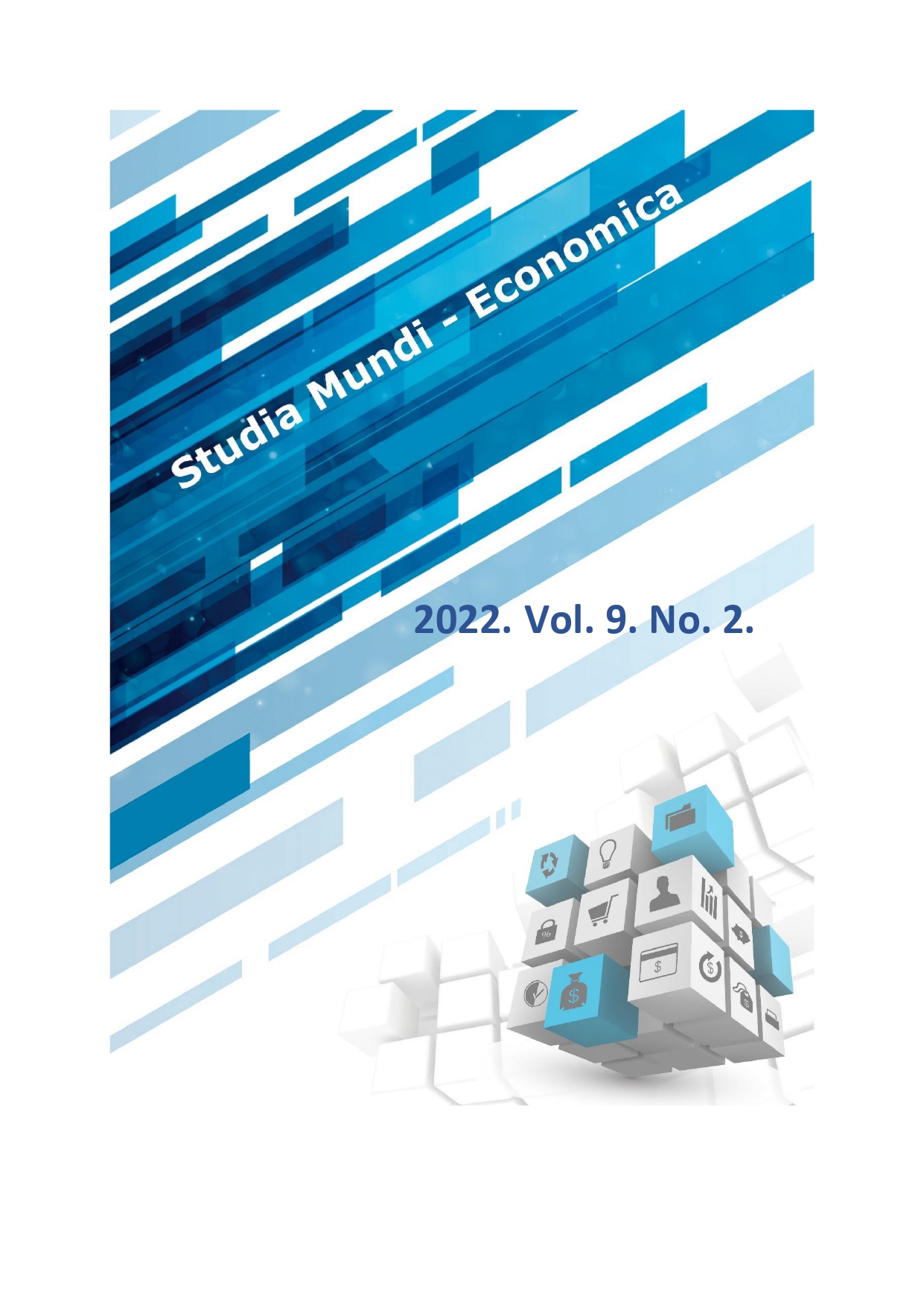Research directions and opportunites supporting the spread of agriculture digitalisation
DOI:
https://doi.org/10.18531/Studia.Mundi.2022.09.02.58-70Keywords:
adat, digitalizáció, agrárium, szolgáltatás, információ, innovációAbstract
Without digitalisation and automation, it is not possible to gain a competitive advantage in the current market situation, and this is also true for agriculture. Technological developments make it possible to use methods, machines, precision tools and processes in agriculture that reduce production costs and the negative impact on the environment. By reducing costs, farmers will be able to increase production, despite the fact that the labor market is struggling with a lack of resources, which is also true for agriculture. For emerging challenges such as climate change, stringent food and nutrition security standards and changing consumer needs can be addressed by seizing the opportunities offered by technology. To do this, farmers need ready-made solutions based on exponentially generated data. The data needs to be made available to producers in the form of services, thus supporting more efficient decision-making. This solution can also exist in framework of community realization, where there is more trust within the farming community, as againts to technological solutions implemented from the outside from the top down. It is not enough to create the right data environment and usable service, but it is also important to bridge the generation gap and low digital literacy problems. To do this, however, it is essential to create a non-profit data environment that collects data from the digital tools used in the business value chain and then makes it available to farmers in the form of services. This will help you make better management decisions. Holistic and open system thinking is essential for success and sustainable agriculture.
References
Alter S. (1980): Decision Support System: current practice and continuing challenges, Addison-Wesley Pub
Bronson K. (2018): Smart Farming: Including Rights Holders for Responsible Agricultural Innovation. Technology Innovation Management Review February 2018: 7-14. DOI: https://doi.org/10.22215/timreview/1135
Bronson K. – Knezevic I. (2016): Big Data in food and agriculture. Big Data & Society January-June 2016: 1-5, DOI: https://doi.org/10.1177/2053951716648174
Carbonell D.A. (2016): The Worry Trick: How Your Brain Tricks You into Expecting the Worst and What You Can Do About It. Oakland, CA: New Harbinger.
Carolan M. (2017): Agro-Digital Governance and Life Itself: Food Politics at the Intersection of Code and Affect. Sociologia Ruralis, Volume57, Issue S1 Pages 816-835, DOI: https://doi.org/10.1111/soru.12153
Fielke S. – Taylor B.M. – Jakku E. (2019): Digitalisation of agricultural knowledge and advice networks: A state-of-the- art review. Agricultural Systems, Volume 180, April 2020, 102763, DOI: https://doi.org/10.1016/j.agsy.2019.102763
Gábor A. (1997): Információmenedzsment, Budapest, Aula Kiadó
Herbert Simon: Administrative Behavior (1947), New York
Jacoby M. – Volz F. – Weißenbacher Ch – Stojanovic L. – Usländer T. (2021): An approach for Industrie 4.0-compliant and data-sovereign Digital Twins. Realization of the Industrie 4.0 Asset Administration Shell with a data-sovereignty extension. Automatisierungstechnik, Volume 69 Issue 12, DOI: https://doi.org/10.1515/auto-2021-0074
Kraft P. – Helm R. – Dowling D. (2021): New business models with Industrie 4.0 in the German Mittelstand. International Journal of Technology, Policy and Management, Vol.21 No.1, pp.47 - 68, No. 1, DOI: https://doi.org/10.1504/IJTPM.2021.114308
Larson R. et al. (2011). Intrinsic motivation and positive development. In R. M. Lerner, J. V. Lerner, & J. B. Benson (Eds.), Advances in child development and behavior, Vol. 41. Positive youth development (pp. 89–130). Elsevier Academic Press, DOI: https://doi.org/10.1016/B978-0-12-386492-5.00005-1
Masuda Y. (1980): Az információs társadalom, OMIKK, Budapest
Monostori T. – Kis K. – Komarek L. (2020): Mezőgazdasági és vidékfejesztési kutatások a jövő szolgálatában. Magyar Tudományos Akadémia Szegedi Akadémiai Bizottság, Mezőgazdasági szakbizottság, Szeged
Nátz K. – Véghné K.D. – Szalay Zs.G. (2022): Smart Agriculture, in XVIII. NEMZETKÖZI TUDOMÁNYOS NAPOK A „ZÖLD MEGÁLLAPODÁS” – KIHÍVÁSOK ÉS LEHETŐSÉGEK 2022-05-05, Gyöngyös
Rajkumar R.R. – Lee I. - Sha L.- Stankovic J. (2010): 44.1 Cyber-Physical Systems: The Next Computing Revolution. Conference: Proceedings of the 47th Design Automation Conference, DAC 2010, Anaheim, California, USA, July 13-18, 2010, DOI: https://doi.org/10.1145/1837274.1837461
Sousa M.J. – Rocha Á. (2019): Skills for disruptive digital business. Journal of Business Research, Volume 94, January 2019, Pages 257-263, DOI: https://doi.org/10.1016/j.jbusres.2017.12.051
Szabó P. (2019): Innováció a szőlőszaporításban, Akadémiai Kió, Budapest, DOI: https://doi.org/10.1556/9789634544494
Szőke V. – Kovács L. (2020): Mezőgazdaság 4.0 – relevancia, lehetőségek, kihívások
Szűts Z. – Yoo J.: „Big Data, az információs társadalom új paradigmája”, Információs Társadalom, XVI. évf. (2016) 1. szám, 8-28. old.
USAID, 2018. Digital farmer profile: Reimagining Smallholder Agriculture. Washington D.C.: USAID 43. p.
Williams L.D. (2021): Concepts of Digital Economy and Industry 4.0 in Intelligent and information systems, International Journal of Intelligent Networks 2 (2021) 122–129, DOI: https://doi.org/10.1016/j.ijin.2021.09.002
Wolfert S. – Ge L. – Verdouw C. – Bogaardt M.J. (2017): Big Data in Smart Farming – A review. Agricultural Systems, Volume 153, May 2017, Pages 69-80, DOI: https://doi.org/10.1016/j.agsy.2017.01.023
Wolfert S. – Goense D. – Sorensen C. (2014): A Future Internet Collaboration Platform for Safe and Healthy Food from Farm to Fork, Annual SRII Global Conference, DOI: https://doi.org/10.1109/SRII.2014.47
Downloads
Published
Issue
Section
License
Copyright (c) 2022 Nátz Katalin, Véghné Kohut Dorottya, Szalay Zsigmond Gábor

This work is licensed under a Creative Commons Attribution-NonCommercial-NoDerivatives 4.0 International License.
A folyóirat Open Access (Gold). Cikkeire a Creative Commons 4.0 standard licenc alábbi típusa vonatkozik: CC-BY-NC-ND-4.0. Ennek értelmében a mű szabadon másolható, terjeszthető, bemutatható és előadható, azonban nem használható fel kereskedelmi célokra (NC), továbbá nem módosítható és nem készíthető belőle átdolgozás, származékos mű (ND). A licenc alapján a szerző vagy a jogosult által meghatározott módon fel kell tüntetni a szerző nevét és a szerzői mű címét (BY).






